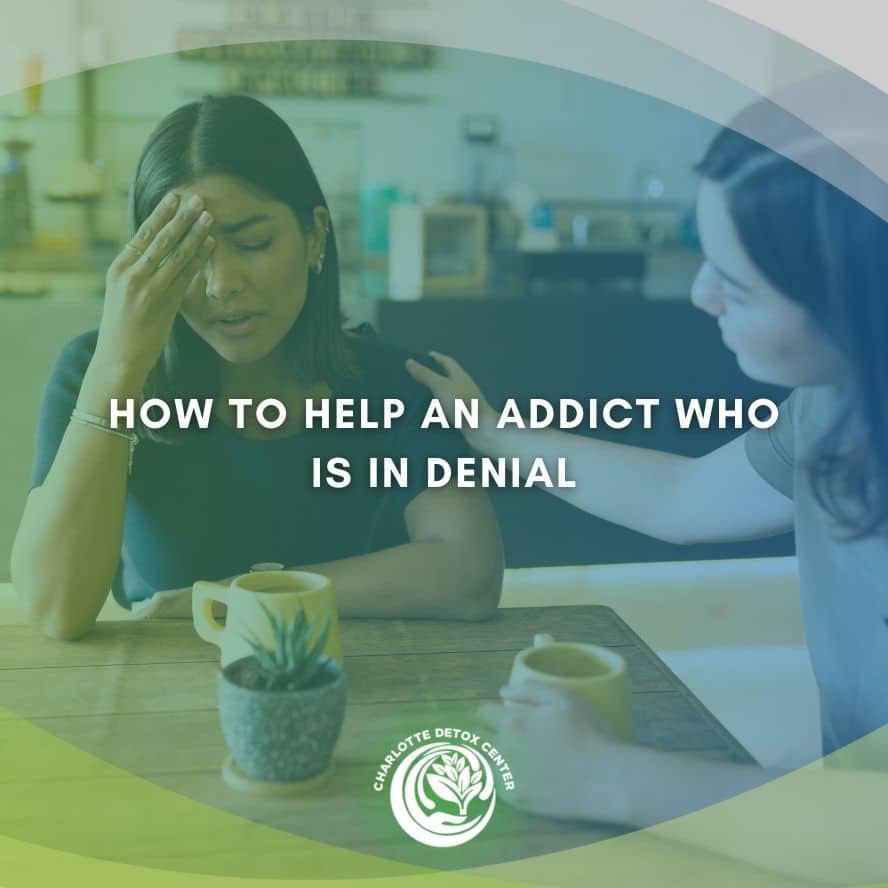Addiction is a serious condition that affects millions of Americans each year. According to the Substance Abuse and Mental Health Services Administration (SAMHSA), 48.7 million people suffered from a substance use disorder in 2022.[1]
Watching your friend or loved one struggle with addiction is never easy. It might be obvious to you that drugs and alcohol are ruining their life, but somehow, your loved one cannot understand the damage that is being done. Watching this unfold can be incredibly frustrating, especially when you know that the other person could improve their life if they simply asked for help.
Oftentimes, addiction causes a person to be unable to recognize how the substances they are abusing are hurting them. All they see is that their uncomfortable emotions are medicated through the use of drugs and alcohol. This is often referred to as addiction denial.
When someone is in denial, it can be difficult to help them understand that they need professional treatment. Simply bringing up that they need help can lead to an argument. Thankfully, there are a few things you can do to help someone struggling with addiction denial to see the light.
What you will learn:
- What addiction denial is
- What are the consequences of denial
- How to help a friend or family member who is struggling with denial
What is Addiction Denial?
According to the National Cancer Institute, denial is “a state in which a person is unable or unwilling to see the truth or reality about an issue or situation.”[2]
When someone suffering from an addiction is dealing with denial, that means that they cannot see how substance abuse is negatively impacting their life. It is common for them to also be unable to see that they have a problem with alcohol or drugs.
If your loved one is struggling with addiction denial, they might:[3]
- Minimize or justify their substance abuse
- Avoiding thinking about how drugs and alcohol impact them
- Avoid taking responsibility for their problems or blame them on someone else
- Refuse to talk about their substance abuse or become defensive when the topic is brought up
It’s important to understand that denial is often used as a defense mechanism. Your loved one is not doing it on purpose, however, accepting the reality that they have an addiction is hard for them to cope with. That said, this refusal to acknowledge their addiction will make things worse in the long run.
What are the Risks of Denial in Addiction?
If your loved one refuses to accept that they have a problem, their addiction will continue to progress over time. The main risk of being in denial is experiencing the consequences of addiction. This could involve things like legal trouble, physical health issues, and even financial problems.
The dangers of being in denial about your addiction include:
- Deteriorating health – Since denial prevents you from acknowledging the negative aspects of substance abuse, your loved one could end up experiencing physical health consequences like liver damage or frequent overdoses.
- Strained relationships- Denial can lead to strained relationships with family members and friends due to conflicts, lack of trust, and exhaustion from constant worrying.
- Legal and financial issues- If your loved one is dealing with denial, their substance abuse could increase until it lands them in legal or financial trouble.
Overcoming denial is never easy, but offering support to your loved one might make a huge difference.
How to Help Someone Who is Struggling With Denial
When someone is dealing with denial, you should:
Stop Enabling Them
The most important thing when dealing with an addict in denial is to stop enabling them. If you find yourself giving them money, bailing them out of legal trouble, or allowing them to treat you unfairly without consequences, you are making it easier for them to stay in denial. The more consequences of addiction that they experience, the more likely they are to acknowledge that they need help for drug abuse.
Approach the Topic Sensitively
You should always have a conversation with your loved one about their addiction. Doing so could help them realize the severity of their substance use disorder. That being said, you need to make sure that you approach the topic with sensitivity and compassion.
If you approach the conversation too aggressively, you could cause your loved one to shut themselves away from you completely. Instead, focus on explaining why you would like to see your loved one sober and how you will be there to support them in any way you can.
Offer Your Support
One of the best ways to help a loved one in denial is to offer your support continually. If you offer to attend 12-step groups like Alcoholics Anonymous or professional therapy with them, they might be more likely to try it out. Once they are in a support group or therapy session, the stories and advice they hear might resonate with them, making them more likely to overcome their denial.
Suggest Professional Treatment
Lastly, the end goal should always be getting your loved one into an inpatient or outpatient addiction treatment center. When talking to an addict about treatment, you should explain all of the ways it will benefit them. For example, you could mention that the therapies offered will help them deal with their emotions or traumas in a healthier manner.
If your loved one refuses treatment initially, it is important not to lose hope. If they see that you are continuing to try to get them help, they might change their mind later on.
Get Connected to a Top-Rated Medical Detox Center
If your loved one deals with addiction or co-occurring mental health conditions, it’s time to get professional help. The first step in addiction recovery is always medical detox. At Charlotte Detox Center, we offer evidence-based and medically assisted detox services to give your loved one the best shot at recovery possible.
Each client at Charlotte Detox Center receives a customized treatment plan and personalized care to address their individual needs and ensure their comfort. Our experienced medical staff is trained on all protocols for helping clients detoxify from drugs and alcohol, and clients meet with medical staff daily. Compassionate and supportive clinical staff ease clients’ transition through withdrawal, providing encouragement and a listening ear.
Contact us today for more information on our drug and alcohol detox center located in North Carolina.
References:
- The Substance Abuse and Mental Health Services Administration (SAMHSA): HHS, SAMHSA Release 2022 National Survey on Drug Use and Health Data
- National Cancer Institute: Definition of denial
- Harvard Health: Denial: How it hurts, how it helps, and how to cope








